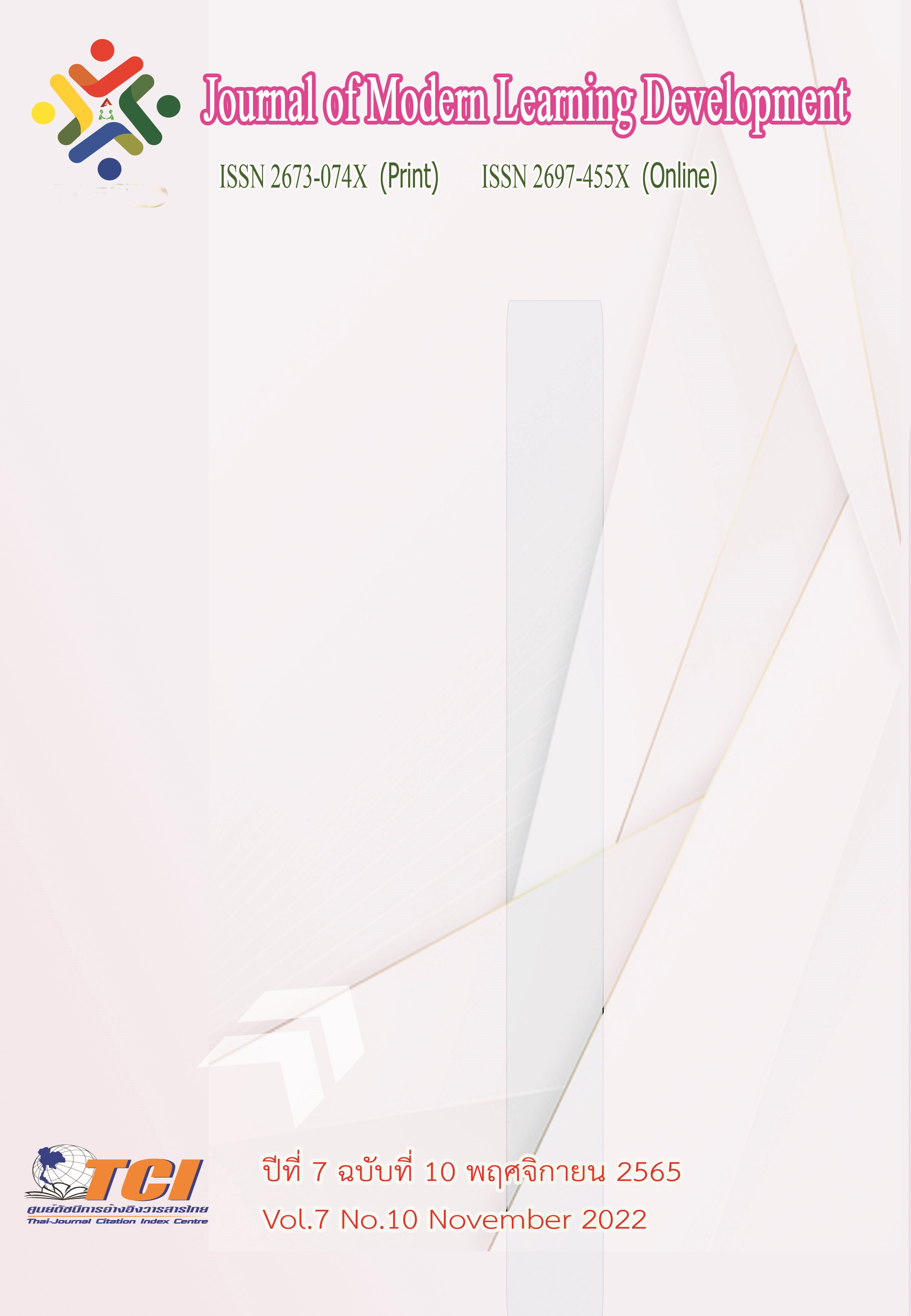The Development of PLC Management Model for Teachers Development of Learning Management through Active Learning Approach based on PAR : A Case Study of Tessaban 4 (Ban Ching Rai) School in Lampang Province
Main Article Content
Abstract
The objective of this research is aim 1) To study the conditions, problems, and needs 2) To create a model 3) To experiment with a model and 4) To Lessons Learned using a model of the PLC for teacher development in learning management through Active Learning approach with PAR. The research was conducted in 4 parts, the study of conditions, problems, needs, model experiments and reflective lessons from using the model. The group of informants consisted of 57 school administrators and teachers. Creative a model. The group of informants consisted of school administrators, teachers' representatives, and experts, totaling 12 people with the data were analyzed using mean values, standard deviations, and content analysis.
The results showed that: 1) A study of conditions, problems and needs was found that
(1) The school administration focuses on participative management using the school base Management, PLC which are also new for teachers. (2) in terms of problem as some teachers still do not understand the PLC administration system (3) In terns of needs assessment as teachers want to encourage and support the development of knowledgeable learning management, environment conducive, organizing structuring facilitates Active Learning approach through PLC processes. 2) Creating a model was found that there were 7 main components which consisted of : (1) Principles (2) Inputs (3) Processes (4) Productivity (5) Positive impacts (6) Constructive data reintegration, and (7) Success factors. The overall evaluation of the suitability of the model was at a high level average. 3) Experimenting with the model was found that overall satisfaction assessment of the model was at a high level average. 4) Lesson transcripts of using model was found that the most suitable model for teacher development as participation in the exchange of learning and Active Learning approach.
Article Details
References
การญ์พิชชา กชกานน, สุดารัตน์ อินทรัตน์ และปุญญาพัฒน์ จันทร์เพชร. (2561). การขับเคลื่อนการศึกษาในระดับโรงเรียนด้วยชุมชนการเรียนรู้วิชาชีพ. การประชุมวิชาการระดับชาติ ครั้งที่ 6 ราชภัฏบ้านจอมบึงวิจัย. 1 มีนาคม 2561. มหาวิทยาลัยราชภัฏบ้านจอมบึง. ราชบุรี: สถาบันวิจัยและพัฒนา.
ครรชิต พุทธโกษา. (2554). คู่มือการพัฒนาชุมชนแห่งการเรียนรู้ฉบับสมบูรณ์. กรุงเทพมหานคร: สำนักงานคณะกรรมการวิจัยแห่งชาติ.
จีรัชญ์พัฒน์ ใจเมือง, สันติ บูรณะชาติ, เทียมจันทร์ พานิชย์ผลินไชย และสมบัติ นพรัก. (2563). รูปแบบการบริหารเพื่อพัฒนาชุมชนแห่งการเรียนรู้ทางวิชาชีพของโรงเรียนขนาดเล็ก สังกัดสำนักงานเขตพื้นที่การศึกษาประถมศึกษา. วารสารศึกษาศาสตร์ มหาวิทยาลัยบูรพา. 31 (2), 55-77.
ชวลิต ชูกำแพง. (2560). ชุมชนแห่งการเรียนรู้ของครู. วารสารวัดผลการศึกษา มหาวิทยาลัยราชภัฏมหาสารคาม. 23 (2), 1-6.
ณรงค์ฤทธิ์ อินทนาม. (2553). การพัฒนาหลักเทียบสาหรับการสร้างชุมชนการเรียนรู้ทางวิชาชีพในโรงเรียน.วิทยานิพนธ์ปริญญาดุษฎีบัณฑิต ภาควิชาวิจัยและจิตวิทยาการศึกษา คณะครุศาสตร์. บัณฑิตวิทยาลัย: จุฬาลงกรณ์มหาวิทยาลัย.
นนทลี พรธาดาวิทย์. (2559). การจัดการเรียนรู้แบบ. Active Learning. กรุงเทพมหานคร: ท ริปเพิ้ลเอ็ดดูเคชั่น.
ไพผกา ผิวดำ. (2564). ชุมชนแห่งการเรียนรู้ทางวิชาชีพสู่ความส าเร็จของสถานศึกษา. วารสารนวัตกรรมการจัดการศึกษาและการวิจัย. 3 (1), 11-18.
มนตรี แย้มกสิกร. (2559). ชุมชนการเรียนรู้วิชาชีพ: ความท้าทายต่อการเปลี่ยนตนเองของครู. การประชุมทางวิชาการของคุรุสภาประจำปี 2559 เรื่อง “การวิจัยนวัตกรรมการเรียนรู้และการจัดการศึกษาเพื่อการพัฒนาที่ยั่งยืน”. กรุงเทพมหานคร: สำนักงานเลขาธิการคุรุสภา.
เรขา ศรีวิชัย. (2554). รูปแบบการบริหารงานสถานศึกษาเอกชนระดับปฐมวัยที่มีประสิทธิผลในจังหวัดนนทบุรี. วิทยานิพนธ์ปริญญาปรัชญาดุษฎีบัณฑิต สาขาวิชาบริหารการศึกษา. บัณฑิตวิทยาลัย: มหาวิทยาลัยศรีปทุม.
วรภาคย์ ไมตรีพันธ์, วรลักษณ์ ชูกำเนิด, ปราณีต ศิริพงษ์ และพงศ์รัตน์ ธรรมชาติ. (2563). หนึ่งทศวรรษกับการขับเคลื่อนชุมชนการเรียนรู้ทางวิชาชีพครูในประเทศไทย: การทบทวนบทบาทของผู้บริหารสถานศึกษาผ่านมุมมองบริบทวัฒนธรรมไทย. วารสารศึกษาศาสตร์ มหาวิทยาลัยนเรศวร. 23 (2), 464-465.
วิจารณ์ พานิช. (2555). วิถีสร้างการเรียนรู้เพื่อศิษย์ในศตวรรษที่ 21. (พิมพ์ครั้งที่ 4). กรุงเทพมหานคร: ตถาตา พับลิเคชั่น.
วิชัย วงษ์ใหญ่ และ มารุต พัฒผล. (2562). การพัฒนาคุณภาพการจัดการเรียนรู้ตามแนวคิดชุมชนแห่งการเรียนรู้ทางวิชาชีพ. กรุงเทพมหานคร: มหาวิทยาลัยศรีนครินทรวิโรฒ.
วิโรจน์ สารรัตนะ. (2553). แนวคิด ทฤษฎี และประเด็นเพื่อการบริหารทางการศึกษา. (พิมพ์ครั้งที่ 8). กรุงเทพมหานคร: หจก. ทิพยวิสุทธิ์.
อุทัย บุญประเสริฐ. (2552). องค์การกับการพัฒนาระบบ. กรุงเทพมหานคร: เอส.พีการพิมพ์.
DuFour R. (2007). Professional Learning Communities: A Bandwagon, an Idea Worth Considering, or Our Best Hope for High Levels of Learning?. Middle School Journal. 39 (1), 4-8.
Mayer, D. & Lloyd, M. (2011). Professional Learning: An Introduction to the Research Literature. Australia: AITSA
Morable, L. (2000). Using Active Learning Techniques. Department of Education, the Texas Higher Education Coordinating Board and Richland College.


